What Can Parliamentarians Do about the WHO?
The WHO may not be under the jurisdiction of any court, and its staff has diplomatic immunity, BUT IT IS NOT UNTOUCHABLE.
1. The WHO's draft Pandemic Agreement of October 30, 2023 and the two later versions attempt to globalize the US' 2005 PREP Act.
The PREP Act created a new pathway for the use of experimental products, without formal informed consent, without the approval of an Institutional Review Board, and with the removal of due process so that parties injured by such experimental products had no means to sue anyone for their injury. This law is what enabled the COVID vaccines to be used on the entire US population despite minimal true testing. We believe it to be unconstitutional but it has not yet been successfully challenged.
The Pandemic Agreement demands that nations create a legal and administrative pathway to enable the use of unlicensed drugs and vaccines for their citizens, and further demands that any liability resulting from such poorly tested or untested products be "managed" and that liability be waived, and that a "no-fault" compensation mechanism be created. In the US only 11 of 12,000 applicants have so far been compensated for COVID vaccine injuries with a total payout for all of $45,000.
Investigating whether similar laws exist in your country, and if so, how they came about, or if they are planned, may be productive. Here are screenshots from the draft Pandemic Agreement, aka Treaty. While this is from the October 30, 2023 draft, later drafts say the same thing.
2. In the US, many laws were enacted in the wake of the 9/11/2001 events and anthrax letters that gave state and federal officials new powers when emergencies were declared by a variety of different officials (the President, the HHS Secretary, governors, the FDA Commissioner).
Other nations may want to investigate whether such laws were passed in their countries and whether they need to be revoked or whether the powers conferred should be limited in scope or duration, and whether the standards for declaring and maintaining emergencies need to be modified.
3. In Article 36 of the existing IHR, state parties are called on to ratify IHR amendments. In the US there has not been formal ratification by the Senate, only an "executive agreement" and a government official's signature for past amendments. Did your country formally ratify the IHR and its amendments in the past? If not, is it a legal treaty to which your country is bound?
4. The UK Health Minister said in December 2023 in Parliament that prior amendments to the IHR have been approved at the WHO by "consensus" rather than a formal vote of members of the World Health Assembly (WHA).
There is a video showing that "Committee A" of the WHO used a so-called consensus procedure regarding the 2022 IHR amendments, but no evidence that the full World Health Assembly (WHA) (194 nations) or parties to the IHR (196 nations) voted on the proposed amendments in 2022.
Twelve Members of the European Parliament wrote to the WHO on November 28, 2023 asking for evidence that a vote of the full WHA was in fact conducted to approve the amendments that were "passed" in May 2022. They requested a response in 48 hours. They have received no response.
If no actual vote by the WHA membership took place regarding new amendments in 2022, should these amendments be considered to be null and void, since there was no formal vote of the WHA as required for amendments to regulations by the WHO Constitution and the IHR itself?
5. The EU has acknowledged that it is negotiating the IHR/Treaty for (some of?) its member states. Did your Parliament give it permission to do so? There are questions regarding whether the EU legally has the competence in public health to do so. It is seeking to claim a higher level of competence in health right now. Can you challenge this?
The EU is not a party to the IHR and is not a member of the WHO. While the EU and WHO staff claim they have the authority to negotiate these two treaties (the amended IHR and Pandemic Agreement) together, have the members of these two organizations given them the authority to do so?
6. The WHO tries to avoid formal votes. It often fails to use the electronic voting devices built in to members' desks, which would provide a "roll call" of recorded votes.
It also likes to conduct secret ballots, and to carry the ballots outside the voting chamber to be counted. Demand a formal, roll call vote on the Treaty and the Amendments by the full WHA.
7. Ask for a formal accounting of what benefits the WHO has provided to your country. Ask for the amount of funds your country has provided in dues and in donations to the WHO. Ask for what specifically those sums have been spent on. Do the benefits (to your country or anyone else) justify the costs involved?
8. Ask for more time to review the negotiated Amendments and a delay in the May votes until 2025. The WHO did not make the current IHR amended draft available by its own 4-month deadline before the May 2024 vote (see Article 55 of the current IHR). The treaty draft relies on the IHR so a vote on it should be delayed as well.
9. Point out that the WHO Constitution restricts the scope of regulations that the WHO can issue, and the proposed regulations far exceed this scope. Therefore, many of the IHR Amendments really need to be moved into a treaty or agreement, and will therefore require a 2/3 vote of the full WHA. Here is the delineation of what regulations are allowed to cover:
https://merylnass.substack.com/p/the-who-constitution-is-at-odds-with
Examples abound of how many of the proposed IHR amendments cannot be treated as regulations, and can only managed by WHO within the context of a treaty/accord/agreement: surveillance of citizens; censorship; the creation of a BioHub and Pathogen Access and Benefit-Sharing System for sharing of Potential Pandemic Pathogens; the creation of enforcement systems; the ability to restrict access to medications—none of these fall within the scope of regulations that the WHO is allowed to issue.
10. If your national constitution guarantees free speech, then the IHR and treaty (both of which demand that nations perform surveillance of their citizens' speech and censor it) are both unconstitutional.
11. The removal of human rights in the IHR goes against most national constitutions and against the Universal Declaration of Human Rights and the International Covenant on Civil and Political Rights, which almost every nation has signed.
Furthermore, the EC's formal response to questions posed by Door to Freedom and Iustitia claimed that:
a) "Article 3 of the proposed IHR respected dignity, human rights and fundamental freedoms of person"--even though this language was crossed out in the amendments
b) "... the EU proposes to insert a specific article on human rights in the pandemic agreement, stipulating that the implementation of the agreement "shall respect, protect and fulfill the human rights and fundamental freedoms of persons, and be in full compliance with international humanitarian law and principles.'"
Professor Francis Boyle notes that humanitarian law is about protecting civilians during wartime and is very different than human rights law and does not provide human rights guarantees.
Parliamentarians might challenge the WHO documents on the basis of human rights. It should be noted that language guaranteeing human rights was just introduced in the March 7, 2024 version of the treaty aka Pandemic Agreement. Human rights guarantees have been moved in and out of prior drafts, as the draftees appear to believe our human rights are negotiable.
12. The WHO proposed in its February 2023 amendments to gain the power to restrict medications or other health measures if they were deemed "disproportionate or excessive."
Restricting medications from patients and doctors is unethical and illegal. There exists no justification for the WHO to take on such inhumane power.
Door to Freedom hopes this information is helpful to you. Please let us know if we can be of further assistance.
Meryl Nass, MD
merylnass@gmail.com




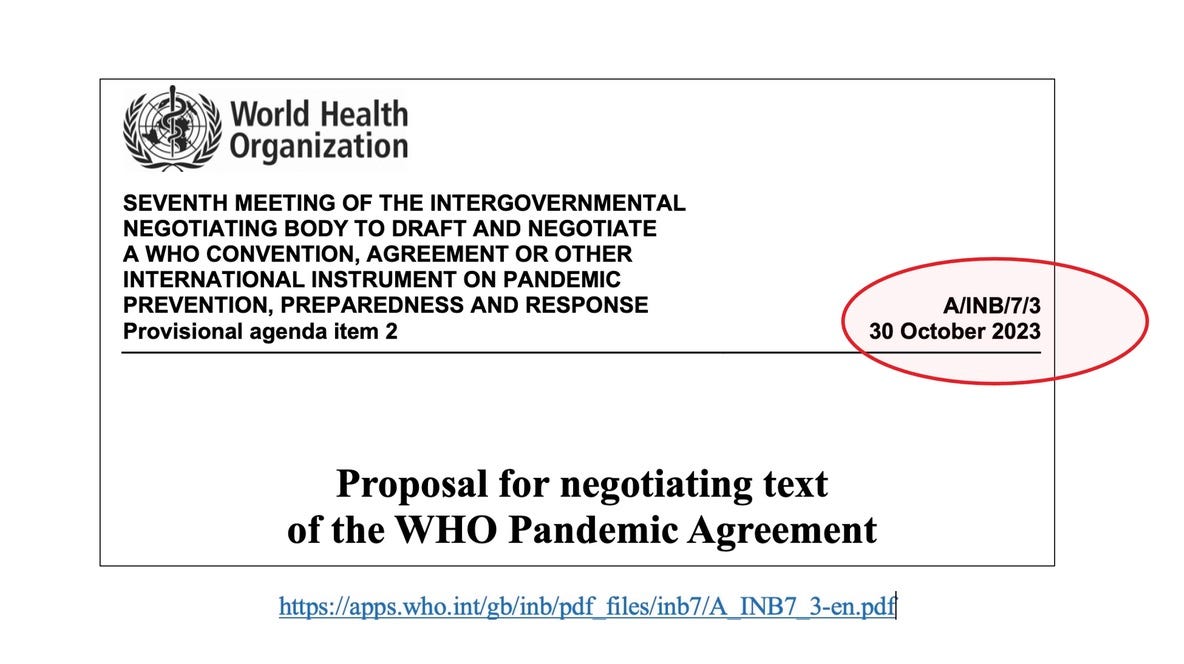
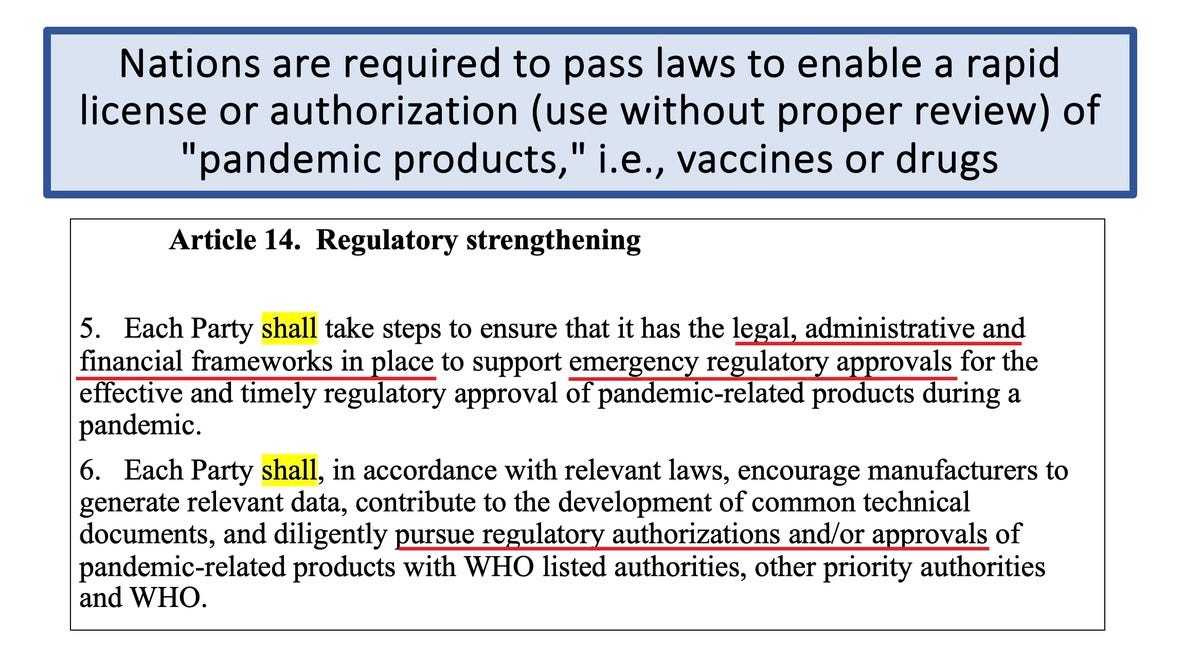
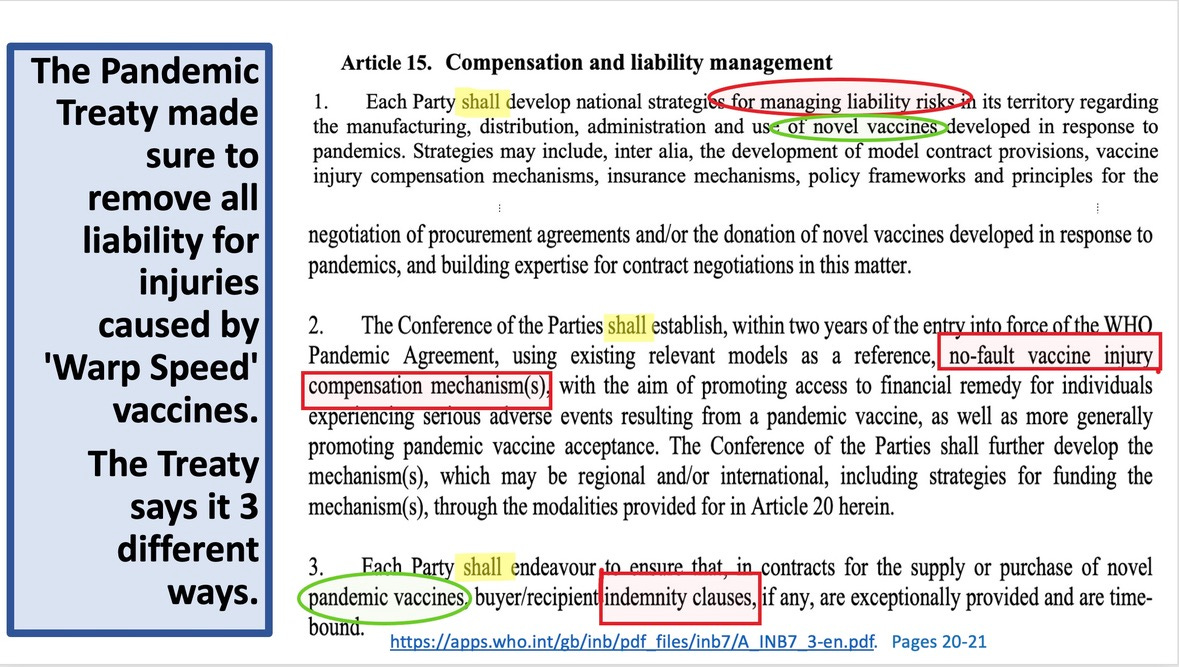
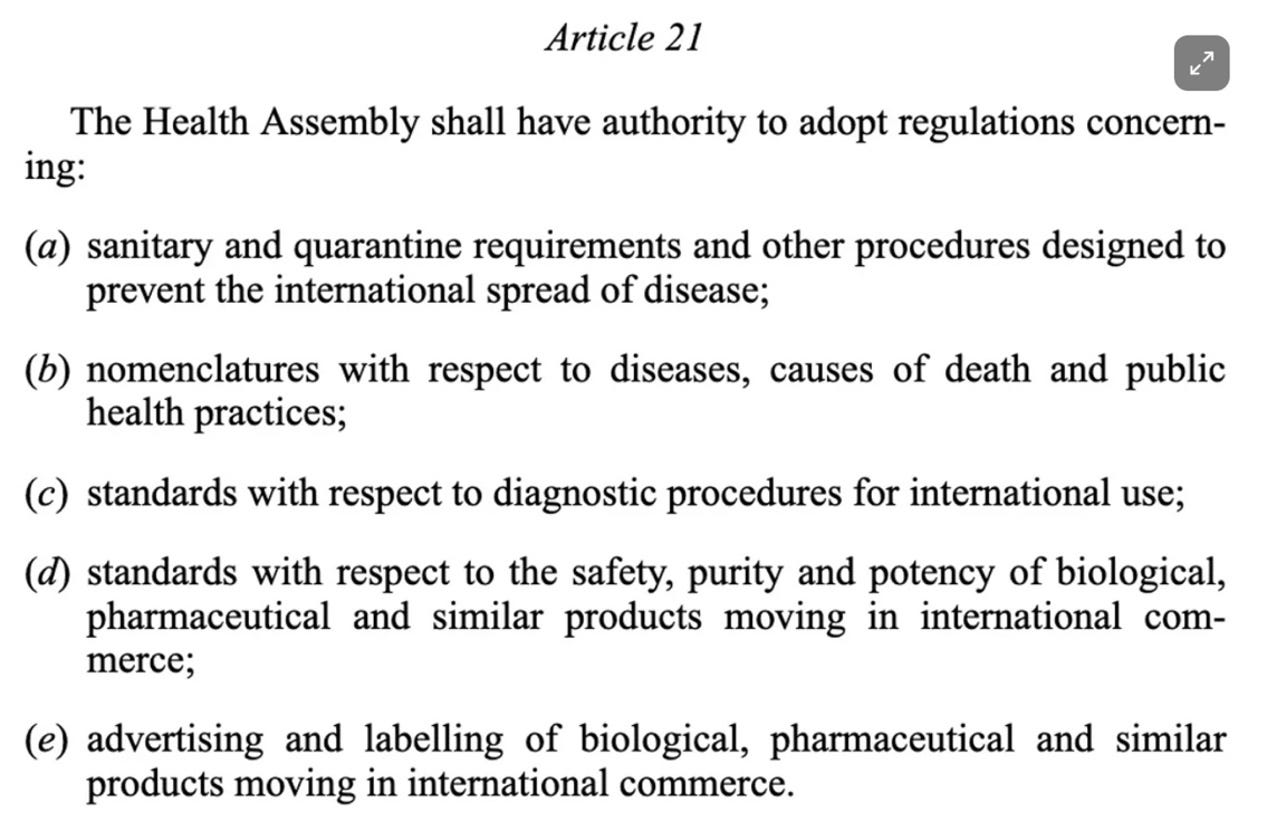
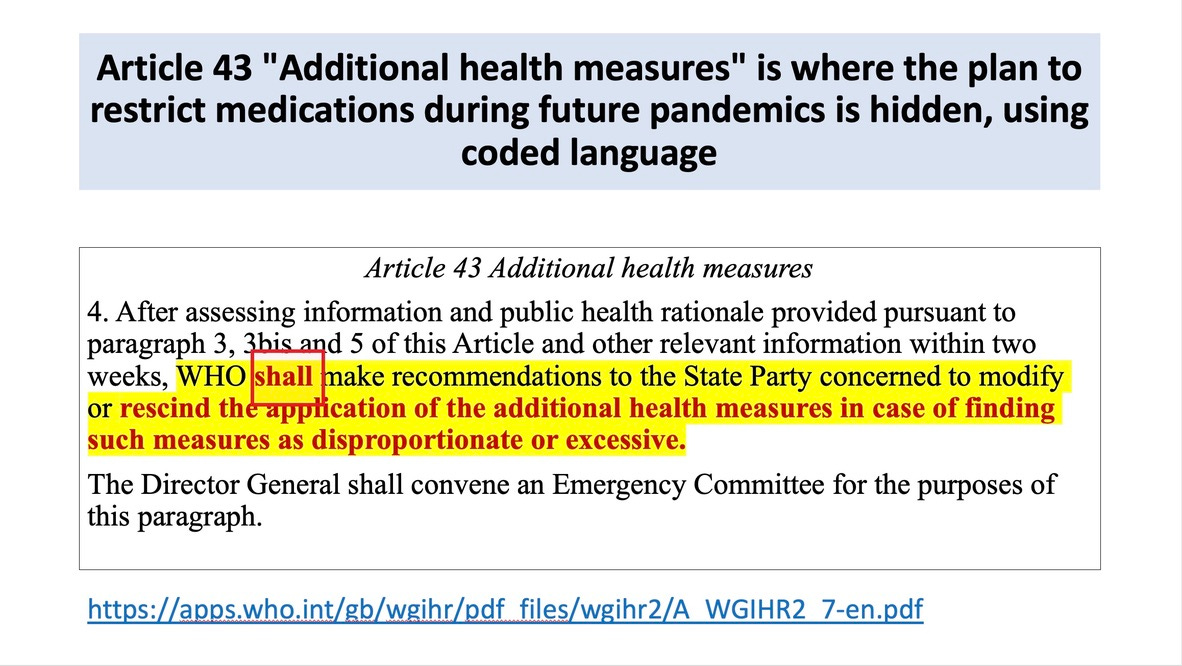
Contact your legislators and make nullifying and rescinding the Prep Act and The National Childhood Vaccine Injury Act their top priority. These two Acts are responsible for massive damage to the American people by profit-seeking industries ...and others who have no regard for American lives.
JFYI - the EU had its “Roadmap to Vaccine Passports” up on its website before 2018.
It was all about tracking & controlling people, countering “vaccine hesitancy & misinformation”, working with Pharma to stockpile product, get new product approved quickly....
They changed the document’s title in late 2022, to make it more opaque - maybe because they realized the “Roadmap to Vaccine Passports” is too blatantly about control.
The title’s now a word salad about “vaccine preventable disease” - because....vaccines give them a ton of cash & an excuse to control humanity.
We’re dealing with evil, power-mad people who feel perfectly entitled to exploit, control & kill.